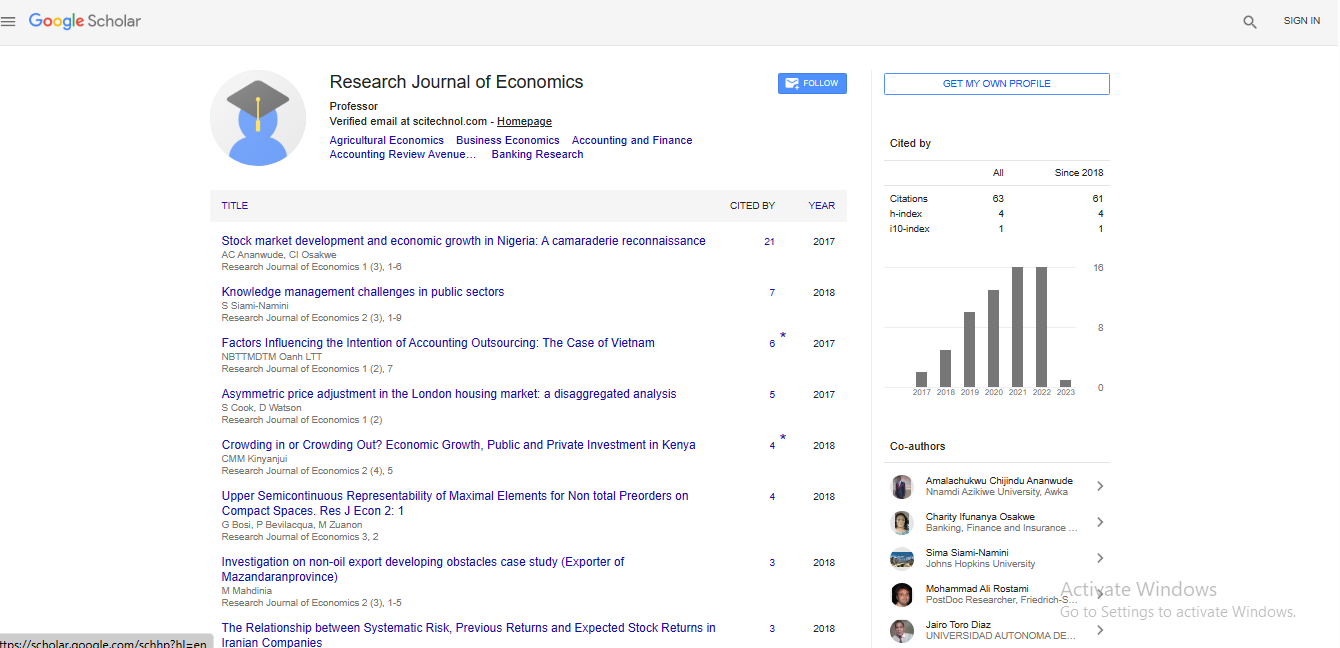Perspective, Res J Econ Vol: 7 Issue: 3
The Dynamic Changes in Agricultural Economics: Its Challenges and Opportunities
Zhang Cui*
Department of Economics, Dalhousie University, Halifax, Canada
*Corresponding Author: Zhang Cui
Department of Economics
Dalhousie University, Halifax, Canada
E-mail: cuizhang@34.cn
Received date: 28 April, 2023, Manuscript No. RJE-23-102332;
Editor assigned date: 02 May, 2023, PreQC No. RJE-23-102332 (PQ);
Reviewed date: 16 May, 2023, QC No. RJE-23-102332;
Revised date: 23 May, 2023, Manuscript No. RJE-23-102332 (R);
Published date: 30 May, 2023 DOI: 10.4172/RJE.1000150
Citation: Cui Z (2023) The Dynamic Changes in Agricultural Economics: Its Challenges and Opportunities. Res J Econ 7:3.
Description
Agricultural economics, at the intersection of agriculture and economics, plays a crucial role in analyzing the production, distribution, and consumption of agricultural goods and services. With a rapidly changing global landscape, driven by factors such as population growth, climate change, technological advancements, and evolving consumer demands, agricultural economists face new challenges and opportunities. This study explores the dynamic nature of agricultural economics, highlighting key aspects that shape the field and its impact on food security, rural development, and sustainability.
The importance of agricultural economics
Agriculture is a fundamental sector of any economy, providing food, raw materials, and employment. Agricultural economics aims to understand the economic behavior of agricultural producers, consumers, and policymakers. By analyzing factors such as supply and demand, price determination, market structures, and government policies, agricultural economists contribute to informed decisionmaking in the sector.
Factors shaping agricultural economics: Population growth and food security, with the world's population projected to reach 9 billion by 2050, agricultural economists grapple with the challenge of ensuring food security. This necessitates increasing agricultural productivity, optimizing resource allocation, and promoting sustainable farming practices.
Climate change and environmental sustainability: Climate change poses significant threats to agricultural systems, affecting crop yields, water availability, and land productivity. Agricultural economists explore mitigation and adaptation strategies, assessing the economic implications of climate-smart practices, renewable energy adoption, and natural resource management.
Technological advancements: The advent of precision agriculture, biotechnology, and digitalization has transformed the agricultural landscape. Agricultural economists study the economic impact of these technologies, analyzing their potential to enhance productivity, reduce costs, and improve resource management.
Global trade and market integration: The globalization of agricultural markets presents both challenges and opportunities. Agricultural economists analyze trade policies, market dynamics, and price volatility, informing farmers and policymakers about the potential benefits and risks of participating in global markets.
Key areas of agricultural economics
Farm management: Farm-level decision-making is a crucial aspect of agricultural economics. Economists assist farmers in optimizing resource allocation, determining production levels, and adopting efficient farming practices. They analyze costs, returns, risk management strategies, and the adoption of new technologies.
Agricultural policy: Government policies significantly impact agricultural systems. Agricultural economists evaluate policy interventions, such as subsidies, price supports, and regulations, to assess their effectiveness, equity, and potential unintended consequences. They also provide recommendations for policy reforms and improvements.
Agribusiness and value chains: Agricultural economists study the economic behavior of firms involved in food production, processing, distribution, and retailing. They analyze market structures, conduct feasibility studies, and assess the efficiency of value chains, helping businesses make informed decisions.
Rural development: Agriculture is closely linked to rural development, as it provides livelihoods and drives economic growth in rural areas. Agricultural economists examine strategies for rural development, including infrastructure investments, access to credit, and diversification of income sources.
Emerging trends and future directions
Sustainable agriculture: As sustainability gains prominence, agricultural economists are exploring the economic viability of sustainable farming practices. This includes organic farming, agroecology, precision agriculture, and conservation agriculture. They analyze the costs, benefits, and potential trade-offs associated with sustainable practices.
Data analytics and artificial intelligence: The increasing availability of data and advancements in artificial intelligence present exciting opportunities for agricultural economists. They can control data analytics to gain insights into market trends, consumer preferences, and production patterns, facilitating evidence-based decision-making.
Behavioral economics: Understanding human behavior and decision-making is crucial for effective agricultural policy design. Behavioral economics, incorporating psychology into economic analysis, helps explain farmer behavior, adoption of new technologies, and responses to incentives.
Conclusion
Agricultural economics plays a vital role in shaping the future of agriculture, ensuring food security, rural development, and sustainability. By analyzing complex factors such as population growth, climate change, technology, and trade, agricultural economists provide valuable insights for policymakers, farmers, and agribusinesses. As the field continues to evolve, embracing emerging trends and interdisciplinary approaches will be key to addressing the challenges and seizing the opportunities that lie ahead in the dynamic landscape of agricultural economics.
 Spanish
Spanish  Chinese
Chinese  Russian
Russian  German
German  French
French  Japanese
Japanese  Portuguese
Portuguese  Hindi
Hindi 